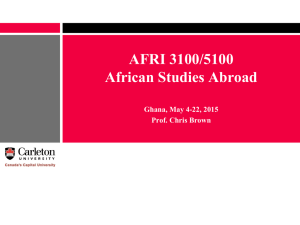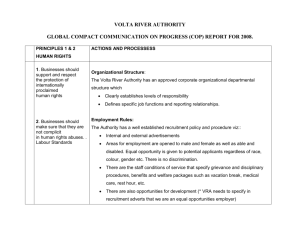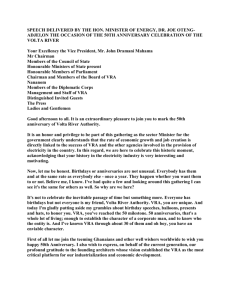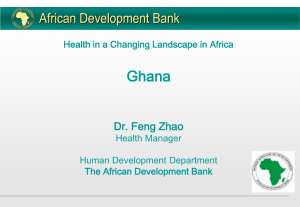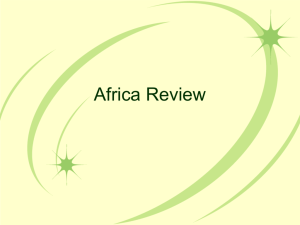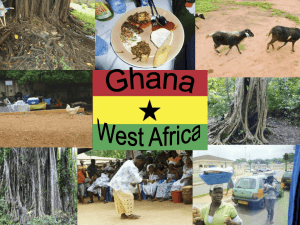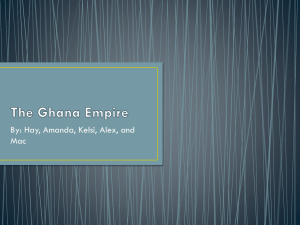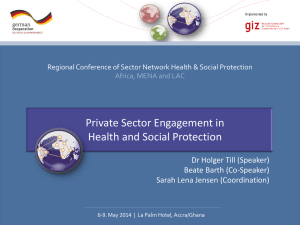Presentation Amekor
advertisement
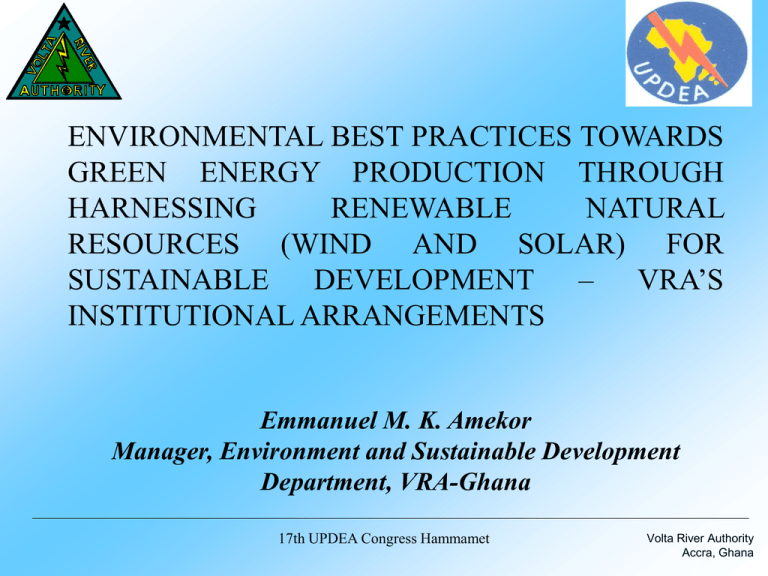
ENVIRONMENTAL BEST PRACTICES TOWARDS GREEN ENERGY PRODUCTION THROUGH HARNESSING RENEWABLE NATURAL RESOURCES (WIND AND SOLAR) FOR SUSTAINABLE DEVELOPMENT – VRA’S INSTITUTIONAL ARRANGEMENTS Emmanuel M. K. Amekor Manager, Environment and Sustainable Development Department, VRA-Ghana 17th UPDEA Congress Hammamet Volta River Authority Accra, Ghana PRESENTATION PLAN Introduction: VRA establishment and Mandates Hydroelectric and Thermal Power Plants Ghana Power Plants, Capacities and Producers The Case for Introduction of Renewable Energy Planned Renewable Projects and Selection Factors Institutional Arrangements Project Implementation Conclusions 17th UPDEA Congress Hammamet Volta River Authority Accra, Ghana VRA ESTABLISHMENT/MANDATE ESTABLISHMENT Established under the Volta River Development Act 1961 (Act 46) MANDATE Primary function is to develop the hydroelectric potential of the Volta River (through the construction of a dam and creation of a lake/reservoir) for the generation, transmission and supply/distribution of electrical energy for industrial, commercial and domestic use in Ghana and neighbouring countries 17th UPDEA Congress Hammamet Volta River Authority Accra, Ghana AKOSOMBO DAM+LAKE VOLTA+HYDROPOWER STATION Volta River 4 Authority Accra, Ghana VRA MANDATE AMMENDMENT AMMENDMENT LAW The Volta River Development (Amendment) Act 2005 (Act 692) revised the VRA mandate: Transmission component of original mandate entrusted to a new National Grid Company. VRA now a purely power generation company Focus now on core business of development of various power stations for electricity generation. 17th UPDEA Congress Hammamet Volta River Authority Accra, Ghana GHANA’S CURRENT ENERGY MIX AS AT SEPTEMBER 2011 PROVIDER TYPE CAPACITY VRA/AKOSOMBO HYDRO 1020MW VRA/AKUSE HYDRO 160MW VRA/ABOADZE (TAPCO) THERMAL 330MW TICO/ABOADZE (JOINT VENTURE) THERMAL 220MW VRA/TEMA (TT1PP) THERMAL 110MW VRA/TEMA(TT2PP) THERMAL 50MW VRA/TEMA (MRP) THERMAL 80MW SUNON ASOGLI (IPP) THERMAL 200MW T3 (UNDER CONSTRUCTION ) THERMAL 132MW 17th UPDEA Congress Hammamet Volta River Authority Accra, Ghana CURRENT ENERGY MIX AS AT SEPTEMBER 2011 TOTAL INSTALLED CAPACITY PERCENT CONTRIBUTION I HYDRO GENERATION 1180MW 47.93% II THERMAL GENERATION 1122MW 45.57% VRA 570MW 23.15% IPPs 420MW 17.06% T3 (UNDER CONSTRUCTION) 132MW 5.36%% III PLANNED RENEWABLE GENERATION (GREEN ENERGY) BY VRA WIND POWER 150MW 6.09% SOLAR POWER 10MW 0.41% TOTAL RENEWABLES BY 2015 160MW 6.50% 17th UPDEA Congress Hammamet Volta River Authority Accra, Ghana THE CASE FOR INTRODUCTION OF RENEWABLE ENERGY SOURCES Environmental problems associated with the combustion of fossil fuels are well known and documented worldwide. Both developed and developing nations are grappling with for solutions to the CO2 and other GHGs and the associated global warming and climate change impacts. VRA since 1998 actively engaged in diversification of its power generation sources from the predominantly hydro to crude oil and lately natural gas thermal plants, gradually reducing the carbon footprint of generation. 17th UPDEA Congress Hammamet Volta River Authority Accra, Ghana JUSTIFICATION OF INTRODUTION OF RENEWABLES INTO ENERGY MIX HISTORY OF VRA DIVERSIFICATION PROGRAMMES GENERATION PLANT TYPE INSTALLATI ON YEAR 1 AKOSOMBO HYDRO 1961 2 AKUSE HYDRO 1982 3 TAKORADI (TAPCO) THERMAL (CRUDE+DIESEL) 1998 4 TEMA (TT1PS) THERMAL (CRUDE +DIESEL) 2008 5 TEMA (TT2PP) THERMAL (DIESEL) 2010 6 TEMA (TT1PS) CONVERTED TO GAS 2010 7 TEMA (TT2PS) CONVERTED TO GAS 2011 8 T3 (UNDER CONSTRUCTION) TRI-FUEL FIRING (GAS AS PRIMARY FUEL) 2011 9 TAKORADI (TICO) TO BE CONVERTED TO GAS SOON 17th UPDEA Congress Hammamet Volta River Authority Accra, Ghana INTRODUCTION OF RENEWABLE ENERGY SOURCES Data from earlier studies carried out by the Ghana Energy Commission were reviewed to decide which types of renewables to introduce. VRA’s RE Development Programme phase 1 (REDP1) aims at developing about 160 MW of installed renewable energy capacity over the next five years. The program consists of three components: Wind Power Phase 1 (150 MW) Solar Power Phase 1 (10 MW) Renewable Energy Planning & Development Integration 17th UPDEA Congress Hammamet Volta River Authority Accra, Ghana RENEWABLE ENERGY DEVELOPMENT PROGRAM PHASE 1: SOLAR POWER PROJECT PHASE 1 17th UPDEA Congress Hammamet Volta River Authority Accra, Ghana INTRODUCTION OF RENEWABLE ENERGY SOURCES Project objectives: 1. Develop & construct a 10 MW Solar PV plant. 2. Asses the technical/financial feasibility of developing Concentrating Solar Power (CSP) Plants in Ghana. 3. Provide training to VRA’s planning, development and operational staff on Developing and operating a solar power plants as well as integrating wind generation into our generation supply and expansion plans. 4. Register the wind farm projects as Clean Development Mechanism (CDM) project in order to utilise CDM proceeds for co-financing of the project. 17th UPDEA Congress Hammamet Volta River Authority Accra, Ghana THE CASE FOR INTRODUCTION OF RENEWABLE ENERGY SOURCES Factors taken into consideration include: Availability of the natural resource (wind/sunshine) Quantity and quality of resource (wind speed, direction solar luminance etc) Quantity of power to be generated in a cost effective manner Availability of land for infrastructural development Environmental and Social impacts in riparian communities Ease of power evacuation through tie-in to the existing national grid system 17th UPDEA Congress Hammamet Volta River Authority Accra, Ghana INSTITUTIONAL ARRANGEMENTS 1 Establishment of E&SD Department Under the Guidelines for Environmental Assessment in Ghana, Energy projects have been classified under the category of projects for which environmental assessment is mandatory VRA therefore charged the Director of the Environment & Sustainable Development Department with the responsibility of satisfying the regulatory requirements of the Ghana EPA Permanent interactive/consultative meetings were put in place to obtain Permits from various other institutions. Eg Energy License, Building permits, Environmental 17th UPDEA Congress Hammamet Permits etc. Volta River Authority Accra, Ghana INSTITUTIONAL ARRANGEMENTS 2 Community Consultations An identification exercise was carried out to detail all potential communities that could be impacted either positively or negatively by project activities. Community meetings were arranged to serve as consultation fora to receive the views of community members about the projects Traditional Chiefs, Opinion leaders, Political representatives and Local Government officials were consulted at separate meetings to enable frank 17th UPDEA Congress Hammamet expression of ideas. Volta River Authority Accra, Ghana INSTITUTIONAL ARRANGEMENTS 3 Environmental and Social Impact Assessment Liaison between VRA and Arrangements including meetings and communication with the Ghana EPA confirmed the level of the environmental assessment that is required for the projects. 4. Multi disciplinary Project Implementation Team A multidisciplinary team from relevant VRA stakeholder Departments including: Engineering Services , Environment &Sustainable Development, Real Estate and Survey Department headed by a Project Director has been set up as a Project Implementation Unit for the Projects. 17th UPDEA Congress Hammamet Volta River Authority Accra, Ghana INSTITUTIONAL ARRANGEMENT – MULTIDISCIPLINARY APPROACH DIRECTOR, ENGINEERING DIRECTOR, ENVIRONMEN T PROJECT MANAGER CIVIIL COORDINATOR CONSTRUCTION CONTRACTOR AND STAFF SURVEY RESSETTLEMENT ELECTRICAL MECHANICAL SUPERVISORS ENVIRONMENTAL COORDINATOR ENVIRONMENTAL QUALITY TECHNICIANS Volta River Authority Accra, Ghana THANKS YOU FOR YOUR ATTENTION Questions & Answers 17th UPDEA Congress Hammamet Volta River Authority Accra, Ghana

